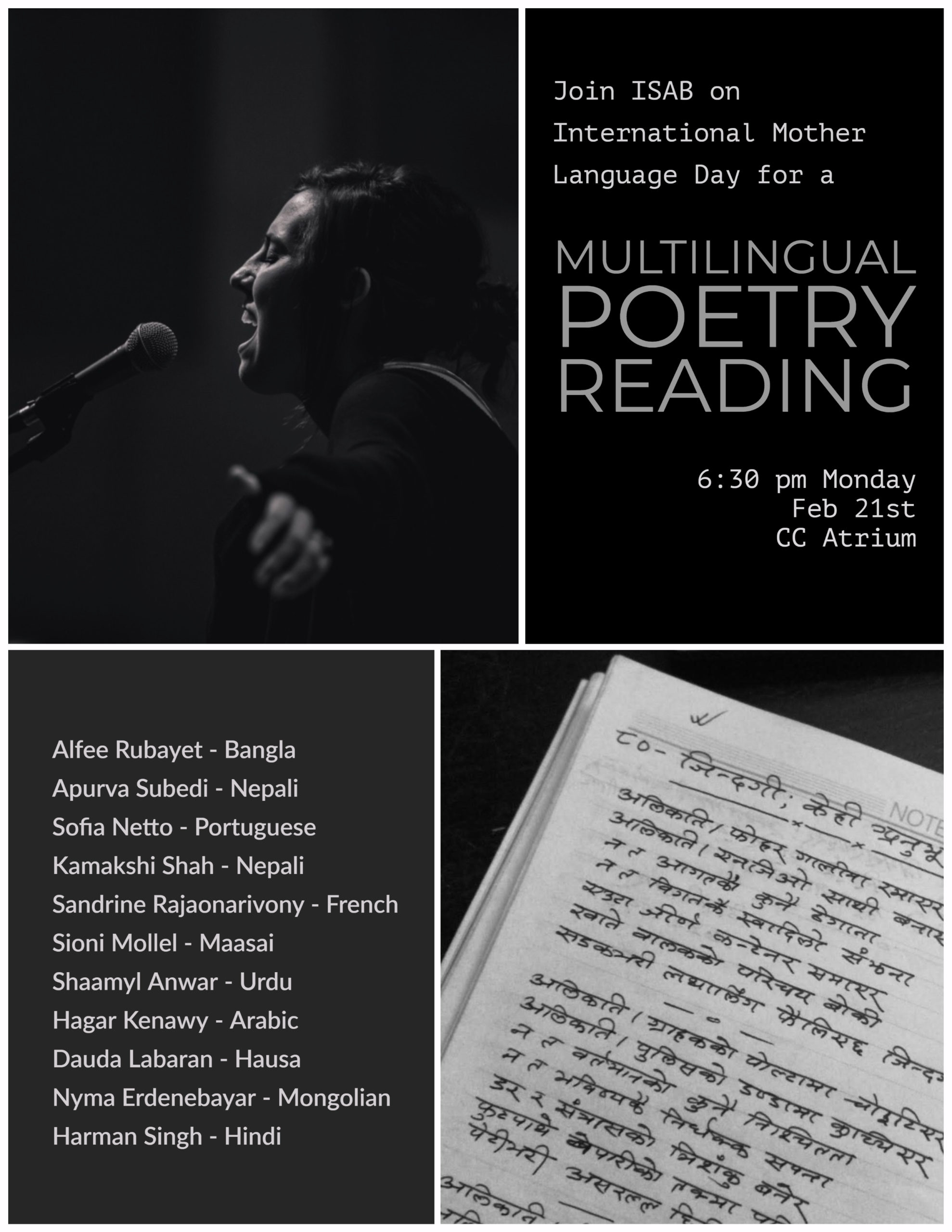By Lily Vining | Campus Life Editor
In celebration of International Mother Language Day on February 21st, International Student Advisory Board (ISAB) hosted a multilingual poetry reading in the Steinman College Center Atrium.
Co-President Diya Dhakal ‘23 expressed great satisfaction with the turnout of both international and local students to support the ten readers. She was especially moved by the Nepali verses recited by her classmates, which “took her back home.”
International Mother Language Day was first proposed at the 1999 UNESCO General Conference and recognized by the United Nations in 2002. The annual celebration promotes awareness of linguistic and cultural diversity. It also honors martyrs who fought for recognition of Bangla in the Bengali Language Movement, as explained by the event’s opener, Alfee Rubayet ‘24. Rubayet shared the poem Bidrohi, translated to “The Rebel,” in her native Bangla, which holds a special connection for her as the anthem she recites in the streets at protests.
Another reader, Apurva Subedi ‘24, expressed an emotional connection to the Nepali poem he recited, which was written by his father to express the challenges he faced upon leaving his home. Subedi relates to his father, who “felt the same things I feel right now” as he attends college in the United States.
Other readers shared poems with similar themes of homesickness, longing, and struggle, as noted by Dhakal. Sofia Netto ‘24 shared a poem in her native Portuguese that expresses the emotions of feeling lonely in a new place. Shaamyl Anwar, ‘23 also focused on the theme of overcoming the oppression that impacted his native Pakistan symbolized in the Urdu poem “The Eagle.”
While some readers expressed fear of their native languages being in danger of extinction or persecution, others recognize that their native tongues are also perpetrators of linguistic oppression. Nepali student Kamakshi Shah ‘22 recognized that her native language is of the dominant caste in Nepal and has negative impacts on mother tongues of historically discriminated castes in the country. As the most popular language in the country, it trumps the other 123 spoken languages, and even endangers the existence of 61. Even so, Shah admits that she has lost touch with the language due to her use of English. Acknowledging the focus of the holiday, Shah expressed a renewed hope to use Nepali more in her daily life with her fellow Nepali classmates to keep it alive for her personally, even while she is away from home.
Even languages like Arabic, which is the 6th most widely spoken language in the world, face obstacles, especially in America. Hagar Kenawy, a Fulbright Scholar acting as a teacher’s assistant for the Arabic department, shared a poem and facts about her language with the audience. To promote retention of her Arabic facts, she passed out prizes to audience members who correctly answered her quiz at the end. Small games like this can serve to excite and interest students in a language that will soon not be offered at F&M due to lack of enrollment.
The showcase was not limited to only poetry recitations. Dauda Labaran, a sophomore from Nigeria, sang in his native language, Hausa. The Hausa song, which he chose because it is his grandma’s favorite, centers on the idea that “Life Happens.” Senior Sioni Mollel also opted to share lines from spoken proverbs more commonly shared in Maasai, one of many languages spoken in her native Tanzania.
One proverb shared by Mollel captured the spirit of the event perfectly. Roughly translated into English, it reads: “home is not far away when you are alive.” Even while studying in the United States, the readers at the poetry event each found a way to bring a piece of home with them and share it with the F&M community.
Sophomore Lily Vining is the Campus Life Editor. Her email address is lvining@fandm.edu.
